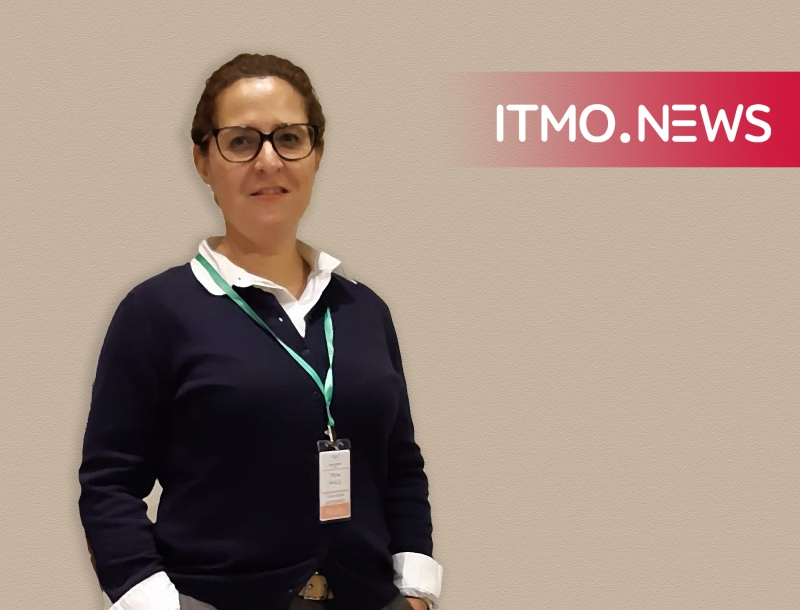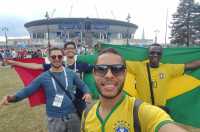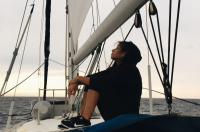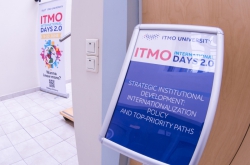Good afternoon, Mona. As a cultural studies expert, what can you tell us about your own cultural background?
My mom is Russian and my dad is Egyptian. I have two countries and two homes; I spend two months in Russia and then two months in Egypt. I’m lucky that I don’t have an identity crisis problem. I know many people who struggle with that because they don’t ever feel native to any country. But everything comes with its pros as well as cons: I sometimes feel I have two lives, and I occasionally feel emotionally overloaded.
What motivated you to come to St. Petersburg and become involved in this course at ITMO?
It just so happened that ITMO and I crossed paths; we came upon each other and I found it interesting, first of all because I wanted a change from Moscow, and secondly because the University somehow managed to grab my interest by saying that the audience I would be teaching would be multinational. In most of my classes, all students share the same cultural background, so I found it interesting to see how different students from different cultures can reveal something about their own culture and learn things about other cultures they would never think about. It’s a captivating process how after a debate or a negotiation we find similarities between different cultures. But overall it’s a very exciting experience.
It’s also interesting when my students realize that something that they thought was a part of their unique individual features is actually a reflection of their cultural background. A great amount of our structure as individuals is molded by our culture, and to notice it is very important if you want to know how to act. This is called culture awareness and it’s the main objective of this workshop. We discuss different concepts and cultures, then, based on based on what we've learned, we analyze how people in different cultures behave and why, as well as their perception of family structure, education, and so on.
At what point in your life did you decide to pursue the socio-cultural aspects of the world professionally? Was there a precise moment?
It’s interesting; I got to a defining moment where I knew that I prefer to do what I like. When I was finishing my PhD, I was mostly interested in religious subjects, and then, at one point, I had to write about the practical results of my research. One of my ideas was that we need religious competence globally to go in hand with cultural competence, then I found myself dealing with cross-cultural issues.
At that moment something eye-opening and captivating happened. I realized that this type of cross-cultural education was somehow absent. At the time, I was helping Russian private businesses with negotiations in Egypt, and they were not doing that well. So, I came to the conclusion that the major problem was in the cultural differences between the two. I thought that Russians needed to have that cross-cultural attribute in business education because we are only heavily focusing on relations with China. We need to teach a way of being able to self-promote our nations to every other culture. I realized this is something that I like to do, want to do, and is necessary. It’s a crucial understanding to have to be able to advance.
Is there one thing you hope your students learn from your course?
Cultural awareness – just this idea of knowing that cultures are different, and make them realize what their culture is, to have some sort of revelation. One example is their understanding of hierarchy and equality, which can show crucial differences between cultures. Religion also plays a big role in the differentiation factors between two cultures. Religion can influence culture as well as the other way around. We can see that, for example, Christianity in different countries affects the cultures differently. Culture sprouts through religion.
I’ll be glad if my students become aware of the everyday life of their own culture and after, other cultures, to simplify and make communication easier between them.
What’s something that you always pack with you when you travel?
Like many women, I always take more clothes with me than I need, I don’t even wear half of them. Also, I always carry books. I have this frustrating idea that I don’t have time for reading, so I always take a book with me to read on the train or plane, at the hotel, etc. And I don’t like electronic books, unfortunately; I find the feel of a real book to be pleasing and I also find that when I digitally evaluate papers, I always miss more spelling mistakes compared to when I print it and work on it physically.
What are some of the things you love to do when you come to a new place?
Try the food, of course, and go to museums. I always want to see the heritage of the place and food is a type of heritage as well. It’s interesting how the food can tell you if the country had a place in history, a rich historical background. A complex cuisine comes with a rich background in that country. For example, you have two neighboring countries: Malaysia and Thailand. When you go to Malaysia you’ll find that its cuisine is quite simple, but next door you have spectacular cuisine because Thailand was a massive kingdom, and the food reflects that. Throughout the years they have been redefining it until it became what we see now. When you have a sophisticated state, you need sophisticated food.
Interviewed by Ethan Avila



